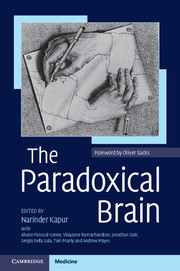Book contents
- Frontmatter
- Contents
- Acknowledgements
- Preface
- Foreword
- Author affiliations
- Abbreviations
- 1 The paradoxical nature of nature
- 2 Paradoxical effects of sensory loss
- 3 Paradoxical functional facilitation and recovery in neurological and psychiatric conditions
- 4 Paradoxes in neurorehabilitation
- 5 The paradoxical self
- 6 Paradoxical psychological functioning in early child development
- 7 Cognitive ageing: a positive perspective
- 8 Paradoxes of learning and memory
- 9 The paradox of human expertise: why experts get it wrong
- 10 Paradoxes in Parkinson's disease and other movement disorders
- 11 Paradoxical phenomena in epilepsy
- 12 Paradoxical creativity and adjustment in neurological conditions
- 13 Paradoxical functional facilitation with noninvasive brain stimulation
- 14 Unexpected benefits of allergies and cigarette smoking: two examples of paradox in neuroepidemiology
- 15 The paradox of autism: why does disability sometimes give rise to talent?
- 16 Paradoxes in creativity and psychiatric conditions
- 17 The paradox of psychosurgery to treat mental disorders
- 18 The paradox of electroconvulsive therapy
- 19 Paradoxes of comparative cognition
- 20 Paradoxical phenomena in brain plasticity
- 21 Immature neurons in the adult brain. Breaking all the rules
- 22 The paradoxical hippocampus: when forgetting helps learning
- 23 Paradoxical effects of drugs on cognitive function: the neuropsychopharmacology of the dopamine and other neurotransmitter systems
- 24 The paradoxical brain – so what?
- Index
Foreword
Published online by Cambridge University Press: 05 December 2011
- Frontmatter
- Contents
- Acknowledgements
- Preface
- Foreword
- Author affiliations
- Abbreviations
- 1 The paradoxical nature of nature
- 2 Paradoxical effects of sensory loss
- 3 Paradoxical functional facilitation and recovery in neurological and psychiatric conditions
- 4 Paradoxes in neurorehabilitation
- 5 The paradoxical self
- 6 Paradoxical psychological functioning in early child development
- 7 Cognitive ageing: a positive perspective
- 8 Paradoxes of learning and memory
- 9 The paradox of human expertise: why experts get it wrong
- 10 Paradoxes in Parkinson's disease and other movement disorders
- 11 Paradoxical phenomena in epilepsy
- 12 Paradoxical creativity and adjustment in neurological conditions
- 13 Paradoxical functional facilitation with noninvasive brain stimulation
- 14 Unexpected benefits of allergies and cigarette smoking: two examples of paradox in neuroepidemiology
- 15 The paradox of autism: why does disability sometimes give rise to talent?
- 16 Paradoxes in creativity and psychiatric conditions
- 17 The paradox of psychosurgery to treat mental disorders
- 18 The paradox of electroconvulsive therapy
- 19 Paradoxes of comparative cognition
- 20 Paradoxical phenomena in brain plasticity
- 21 Immature neurons in the adult brain. Breaking all the rules
- 22 The paradoxical hippocampus: when forgetting helps learning
- 23 Paradoxical effects of drugs on cognitive function: the neuropsychopharmacology of the dopamine and other neurotransmitter systems
- 24 The paradoxical brain – so what?
- Index
Summary
Damage to any part of the body, if severe enough, can cause a corresponding loss of function: cardiac failure, liver failure, renal failure, etc. That this could also occur with specific areas of the brain was supported, in the 1860s, by Broca's demonstration that damage to a particular area of the left frontal lobe led to expressive aphasia – an indication, he felt, that this area constituted a ‘centre’ for speech. Classical neurology was founded on this deficit/lesion model, and the clinico-pathological method remains the foundation of neurology today. Indeed, in the last few decades, it has flourished, with the added power of brain imaging, which makes it possible to visualize brain lesions and their effects in living patients.
But there have been dissenting voices from the start – in particular, that of Hughlings Jackson, who also studied aphasic patients, but came to think that Broca's view of aphasia – as no more than a loss of function – was inadequate. The loss of speech, Hughlings Jackson emphasized, was never the sole symptom in aphasia; there were always ‘positive’ ones as well, which were unmasked or released as a consequence of the lesion; one of his papers, for example, was entitled ‘Singing by Speechless (Aphasic) Children’ (Jackson, 1871). In his 1884 Croonian Lectures on ‘Evolution and Dissolution of the Nervous System’, Jackson wrote, ‘The symptomatology of nervous diseases is a double condition; there is a negative and there is a positive element in every case’ (1884, p. 591).
- Type
- Chapter
- Information
- The Paradoxical Brain , pp. xiv - xvPublisher: Cambridge University PressPrint publication year: 2011

